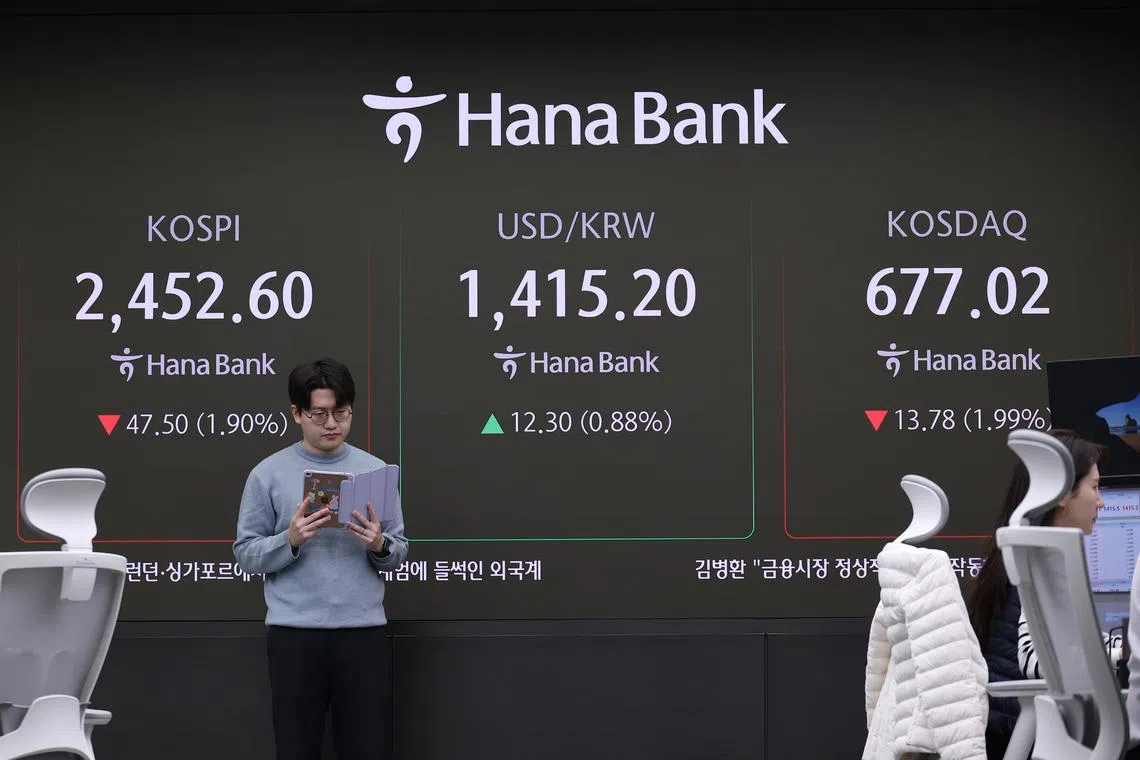South Korea shares fall at close as political tensions continue; Asia markets mixed
Sign up now: Get ST's newsletters delivered to your inbox

The benchmark Kospi opened sharply lower, down 1.9 per cent, but pared losses to recover to 1.44 per cent, closing at around 2,464.
PHOTO: EPA-EFE
Tan Weizhen
Follow topic:
SINGAPORE – South Korean shares continued to fall by the close on Dec 4, after President Yoon Suk Yeol declared martial law overnight.
He lifted the decree within hours,
The benchmark Kospi opened sharply lower, down 1.9 per cent, but pared losses to 1.44 per cent, closing at around 2,464.
Major Korean stocks were in the red. Samsung was down nearly 1 per cent, Hyundai Motor fell more than 2.5 per cent, and Lotte tumbled 2.1 per cent.
The won, which weakened against the US dollar overnight by as much as 2.9 per cent, pared some losses. Swinging between declines and gains in early Korean trade, it last traded at 1,408.71 per dollar.
While the currency has since pared most of the losses after the Bank of Korea (BOK) promised “unlimited liquidity” to stabilise the foreign exchange (FX) market, analysts believe the won will likely remain under selling pressure and languish above the 1,400 level through 2025.
Mr Rohit Garg, an FX analyst at Citibank, said the won’s rebound on Dec 2 was mainly due to FX interventions by the BOK.
“We believe these new developments should increase (capital) outflow pressures,” he added. “That said, we also believe that the authorities (BOK) have the ability to intervene as much as needed in the FX market.”
Analysts said the domestic political crisis adds to the challenges that will trouble the won in the coming year.
Mr Peter Chia, senior FX strategist at UOB, said: “Already, US President-elect Donald Trump’s proposed trade tariffs against China are expected to weigh on the Chinese yuan and spill over negatively to the Korean won.”
He added that South Korea is already seen as one of the most vulnerable export-driven economies in Asia if Trump’s tariffs disrupt global trade and economic growth.
Other Asia-Pacific markets were mixed by the afternoon. Japan’s Nikkei 225 was trading flat, while Hong Kong’s Hang Seng index reversed earlier losses to gain 0.3 per cent. Australia’s ASX 200 lost 0.4 per cent.
Korean American depositary receipts (ADRs) – Korean stocks traded in the United States – sold off overnight, declining around 6 per cent, Morningstar noted.
Foreign investors have been exiting Korea’s stock market since August, with outflows in four months reaching more than US$14 billion (S$18.8 billion), according to data from Reuters.
But Morningstar remains optimistic.
“We don’t expect the sell-off in the ADRs to continue. However, we may see a subdued but still negative impact to share price action in the Korean market when it opens for trade,” it said.
“This event highlights that the political risks and the leadership issues in Korea remain,” it added.
Morningstar’s fair-value estimates for South Korean stocks under its coverage, however, remained unchanged as it sees the martial law development to be short-term. It noted that share price weakness is an opportunity for investors to buy selectively.
Strategists said the won could face more headwinds.
Maybank, in a note on Dec 4, said further developments could pose more risk for the won. “We think that Korean won could remain under pressure, with confidence shaken and growing calls for Mr Yoon to resign or face impeachment,” it added.
UOB noted that the dollar will continue to strengthen against the won, with its forecast for the dollar-won pair to reach 1,420 by the first quarter of 2025 and 1,460 by the third quarter.
“In the event the political crisis worsens further to become a drag to the economy, we would not be surprised the forecasts may be reached sooner than expected,” the bank added. THE BUSINESS TIMES
Additional reporting by Ovais Subhani

